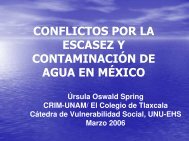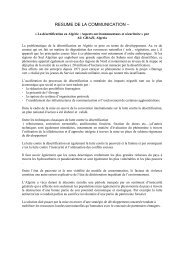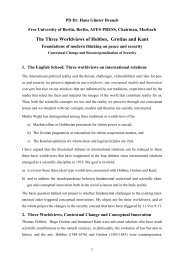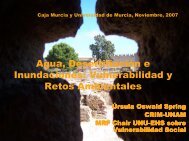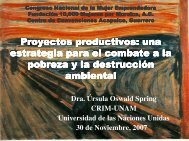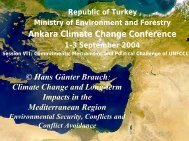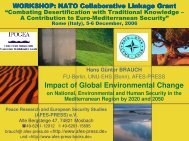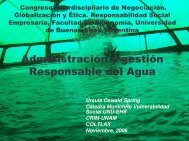Soil security
Soil security
Soil security
Create successful ePaper yourself
Turn your PDF publications into a flip-book with our unique Google optimized e-Paper software.
Presentation of the<br />
UNCCD Report<br />
Thursday, 14 May 2009,<br />
UN Headquarters<br />
SECURITIZING<br />
THE GROUND,<br />
GROUNDING<br />
SECURITY<br />
Hans Günter Brauch<br />
Úrsula Oswald Spring
Contents<br />
1. Questions & Objectives of the Study<br />
2. Policy Context: Multiple Crises & Their Causes<br />
3. DLDD: Scientization, Politicization, Securitization<br />
4. Securitizing the Ground & Grounding Security<br />
a. <strong>Soil</strong> In<strong>security</strong> as a Security Danger & Concern<br />
b.Towards proactive policies for soil <strong>security</strong><br />
5. Diagnosing DLDD with the PEISOR Model<br />
6. Addressing Causes & Security Impacts of DLDD<br />
7. Implementing Knowledge to Action<br />
8. Policy Recommendations
1. Questions of the Talk<br />
• Why are Desertification, Land Degradation and<br />
Drought (DLDD) discussed as <strong>security</strong> issues<br />
• Does DLDD pose <strong>security</strong> dangers and concerns for<br />
whom, from what and how<br />
• What does the concept of soil <strong>security</strong> mean<br />
• Why is securitizing the ground policy-relevant<br />
• Which proactive policy measures are needed to<br />
ground <strong>security</strong><br />
• Goal: Develop a combined soil, water and food<br />
<strong>security</strong> for the people most affected by DLDD
Key Thesis of the Talk<br />
“Poor soils result in poor<br />
people. We take the land for<br />
granted” (Luc Gnacadja).<br />
About 1.4 billion people in<br />
110 countries suffer from<br />
desertification, land<br />
degradation and drought<br />
(DLDD)
2. Policy Context:<br />
Multiple Crises & Their Causes<br />
1. Financial/economic crises: collapse of banks, insurance,<br />
companies, decline in GDP, wealth and remittances of<br />
migrants, increase in unemployment; public bailout 4.1 trillion<br />
US$ (April 2009).<br />
2. Population Growth: last century from 1.6 to 6.1 billion and<br />
water consumption increased six fold; until 2050 projected to 9<br />
billion, mostly in drylands in poor countries.<br />
3. Water Security: By 2025, 2.8 billion people in 48 countries will<br />
face water stress due to scarcity, overexploitation of aquifers,<br />
pollution & salinization (40 in West Asia & Africa).<br />
4. Climate Change by 2100: temperature increase 1.1 to 6.4°C;<br />
sea-level may rise 18 cm to 2.4 metres; precipitation decline<br />
and temperature increase: hotter drier in drylands with more<br />
hazards (heat waves, drought, forest fires and storms & floods<br />
affecting people and economy).<br />
5. Food Crises: One billion of people suffer from hunger today;<br />
food price rise provoked 44 million more hungry & 110 million<br />
people were driven into poverty. MDG cannot be reached<br />
affecting above all rural and urban poor.
DLDD as a Challenge to Humankind<br />
• No agreement on extension of drylands and land<br />
affected by Drought, Land Degradation and<br />
Desertification (DLDD): 33-41% of the Earth.<br />
• Anthropogenic & climate change creates a vicious<br />
circle of drought, forced migration, political crises<br />
and conflicts with threats for human, national and<br />
international <strong>security</strong>, aggravated further by:<br />
– poverty (overgrazing, overexploitation and land use change)<br />
– market-driven expansion of agricultural production and<br />
– depletion of aquifers in drylands and salinization of land.<br />
• Desertification costs: US$ 42 billion/year (Africa:<br />
US$ 9 billion/year).
Global soil degradation (% affected area).<br />
Source: WBGU (2006) based on GLASOD (1990)
Human-induced <strong>Soil</strong> Degradation<br />
Source: ISCRIC-UNEP (1996: 12)
Interactions of GEC
3. Addressing DLDD: Scientization,<br />
Politicization, Securitization<br />
Three stages of Global Environmental Change<br />
(GEC) and of DLDD can be distinguished:<br />
a) since 1970’s of scientific agenda-setting and<br />
research (scientizing),<br />
b) 1992 (Rio de Janeiro): politicizing<br />
c) securitizing: of water (The Hague 2000);<br />
desertification (Valencia 2003); climate change<br />
(Security Council 2007).
Scientization<br />
• Global Assessment of Human Induced <strong>Soil</strong> Degradation<br />
(GLASOD) (1990) first global assessment of soil degradation.<br />
• TerrAfrica scaling up support for country-driven (SLM)<br />
practices in Sub-Saharan African countries and NEPAD.<br />
• DesertNet interdisciplinary group of scientists in Europe to<br />
support communication with policy makers and stakeholders.<br />
• ARIDnet research coordination network in Americas and<br />
Australia addressing biophysical & socio-economic factors of<br />
desertification.<br />
• Earth System Science Partnership (ESSP) with: climate<br />
change (WCRP), International Geophysical and Biological<br />
Programme (IGPB), biodiversity (DIVERSITAS), and IHDP.<br />
• No science programme on soil issues and similar<br />
assessment body compared to IPCC exists.
Politicization<br />
• Earth Summit in Rio, 1992 with 3 conventions:<br />
climate change (UNFCCC), biodiversity (CBD) and<br />
desertification (UNCCD) promote international<br />
governance and World Water Fora.<br />
• UNCCD put DLDD on international political agenda<br />
through its conferences of parties (COPs) &<br />
Committee for the Review of the Implementation of<br />
the Convention (CRIC).<br />
• 2007: debate of the Security Council on Climate<br />
Change recognized DLDD issues within climate<br />
related <strong>security</strong> risks.<br />
• UNCCD lacks a report on the potential costs of nonaction<br />
for DLDD (Stern Report).
4. Security and Securitzation<br />
• Which Security Security for whom (referent object);<br />
<strong>security</strong> of what (endangered values); <strong>security</strong> from whom<br />
(sources of fear)<br />
• “Security, in an objective sense, measures the absence of<br />
threats to acquired values, in a subjective sense, the<br />
absence of fear that such values will be attacked”. From a<br />
constructivist approach <strong>security</strong> is intersubjective or refers<br />
to “what actors make of it”.<br />
• “Securitization<br />
Securitization”: is a political process where a danger is<br />
declared as an “existential threat” that requires<br />
extraordinary political measures.<br />
• The threat is posed by us (our socioeconomic behaviour) and<br />
the impact of anthropogenic climate change.<br />
• Goal is not militarization of the environment but the<br />
demilitarization of the environmental dimension of<br />
human <strong>security</strong>!
Securitizing the Ground (Land, <strong>Soil</strong>)<br />
Grounding Security<br />
• Spain & UNCCD launched process of<br />
securitization of DLDD (Almería 1994, 2006;<br />
Valencia 2003/07)<br />
• Present study:<br />
– Securitizing the ground creates a wider global<br />
political awareness for DLDD and its societal<br />
consequences, as a key international political<br />
problem by upgrading it as a <strong>security</strong> issue.<br />
– Grounding <strong>security</strong> includes reactive/proactive<br />
short and long-term strategies for mitigation and<br />
adaptation to soil in<strong>security</strong> and its consequences.
New <strong>Soil</strong> Security Concept<br />
<strong>Soil</strong> <strong>security</strong> is threatened by<br />
– the spatial expansion of drylands<br />
– the severe degradation of soils and related fertility and biodiversity loss<br />
due to geophysical, wind and water erosion<br />
– drought resulting in crop yield decline<br />
– DLDD has triggered severe periods of famine<br />
<strong>Soil</strong> <strong>security</strong> is achieved when efforts succeed<br />
– to conserve/ restore soil fertility<br />
– to contain land degradation and combat desertification<br />
– to reduce consequences of drought by improving livelihood<br />
<strong>Soil</strong> <strong>security</strong> can be analysed from the perspective of state,<br />
human, gender and environmental <strong>security</strong> referring to<br />
– loss of soil capacity for regulating & storing water<br />
– depletion of aquifers for drinking and irrigation affecting the survival of<br />
people at risk
5. DLDD & Impacts: PEISOR Model
Societal Outcomes<br />
– Hunger, famine<br />
– Migration to urban<br />
slums<br />
– Rural-rural migration<br />
– Transborder migration<br />
– Crises: domestic<br />
– Conflicts:<br />
•Peaceful protests<br />
•Violent clashes<br />
– Complex emergencies
Global Hunger Index 1990 & 2008<br />
2008 Global Hunger Index<br />
Country progress in reducing<br />
the Global Hunger Index<br />
between 1990 and 2008 <br />
Source: IFPRI, 2008
Migration currents<br />
Source:
Environmental conflicts (1980-2006)<br />
Source: WBGU (2008: 32)
6. Addressing Causes &<br />
Security Impacts of DLDD<br />
• Requires political strategy for complex nature-human<br />
interactions where emerging risks are linked to<br />
multiple & simultaneous crises<br />
• Involving the state, society, business & academia<br />
• Adopting proactive response strategies, policies and<br />
measures with best practices, traditional and modern<br />
scientific knowledge<br />
• Focusing on soil <strong>security</strong> to enhance problem<br />
awareness on environmental risks for people and<br />
ecosystems<br />
• Requiring anticipatory learning & proactive policies<br />
to prevent further deterioration & mitigate soc. impacts
7. From Knowledge to Action<br />
• <strong>Soil</strong> <strong>security</strong> concept highlights causes,<br />
effects, impacts and societal outcomes of<br />
soil in<strong>security</strong> & contribute proactive policies for<br />
grounding <strong>security</strong><br />
• Emerging <strong>security</strong> challenges of DLDD<br />
require extraordinary proactive policy<br />
measures to counter worst case developments<br />
in vulnerable hotspots.<br />
• Cost of inaction or late policy response are<br />
much higher than acting early by launching<br />
proactive strategies, policies and measures.
Implementing Knowledge to<br />
Action Requires<br />
1. Extraordinary Policy Measures for Enhancing<br />
<strong>Soil</strong> Security<br />
2. Demand Side Management and Efficiency<br />
Improvements<br />
3. Supplying More Environmental Services and<br />
Food with Less Resources<br />
4. Transition to Alternative Livelihoods and<br />
Sustainable Economy<br />
5. Responding to and Coping with Environmentally-<br />
Induced Migration<br />
6. Avoiding Environmentally-Induced Conflicts
Extraordinary Policy Measures for<br />
Enhancing <strong>Soil</strong> Security<br />
Securitizing the ground with policy measures:<br />
– prevent weakening livelihood of affected, often<br />
poor people in developing countries<br />
– support of financial and administrative<br />
capacities by well-equipped state<br />
– supplying more environmental services and<br />
food with fewer resources<br />
– developing alternative livelihoods in drylands<br />
– responding to/coping with environmental<br />
migration & conflicts
Demand Side Management and<br />
Efficiency Improvements<br />
• river basin management, flood protection &<br />
reforestation<br />
• recovering mountain ecosystem: erosion control,<br />
water harvesting, soils and biodiversity conservation,<br />
disaster mitigation in lower-lying densely populated<br />
areas<br />
• in river plains & valleys: sustainable, participative land<br />
planning for agriculture, life-stock & urbanization<br />
• long-term monitoring desertification indicators needs<br />
information on land and water degradation trends &<br />
complex interrelationships with human activities<br />
• field studies on natural, human, societal, cultural and<br />
historic conditions in drylands
Transition to Alternative Livelihoods<br />
and Sustainable Economy<br />
• Decentralized governance: traditional<br />
knowledge from women, peasants, grassroots<br />
movements against desertification<br />
• Consolidation of local leadership (clergymen,<br />
spiritual leaders, doctors, lawyers, schools,<br />
teachers) and training (old/young people,<br />
migrants)<br />
• Off-farm farm jobs create financial resources to<br />
recover degraded land and feed people<br />
• Concrete Action Programmes to prevent<br />
migration, crises and conflicts
Avoiding Environmental Conflicts<br />
• Anticipatory learning, peace building,<br />
multidisciplinary search for action-oriented<br />
strategies to cope with root causes and socioeconomic<br />
implications.<br />
• Functional cooperation against soil erosion,<br />
DLDD, water scarcity & pollution, employment in<br />
rural areas and in intermediary urban networks.<br />
• Empowerment of grassroots stakeholders<br />
enhance human and societal <strong>security</strong>, expands<br />
adaptation measures for soil <strong>security</strong> & reduces<br />
costs of coping with consequences.
8. Policy Recommendations<br />
UNCCD pursues 5 operational objectives in its 10<br />
years strategy (2007):<br />
• Knowledge Creation & Management<br />
• Awareness Raising<br />
• Policy Advocacy<br />
• Capacity Building<br />
• Channelling Resources
Awareness Raising<br />
• Cooperation with universities,<br />
research institutes in translating<br />
knowledge to actions on DLDD<br />
• Documenting soil <strong>security</strong> hotspots<br />
• Best practices and experience on<br />
extreme land degradation<br />
• Dissemination of information
Policy Advocacy<br />
Expert community on DLDD to foster cooperation<br />
between science and policy making on soil <strong>security</strong><br />
issues.<br />
UNCCD with FAO, UNESCO, WHO, WMO, UNDP,<br />
UNEP, UNU, UNSO, OSCE, NATO, IUCN & CGIAR to<br />
prioritize soil <strong>security</strong> for sustainable dryland<br />
management.<br />
International workshops on practical experiences for<br />
territorial governance.<br />
Pro-active strategies to counter DLDD with rural<br />
production, renewable energy or ecotourism.<br />
Countries affected by DLDD may enact legislation on<br />
soil <strong>security</strong> for sustainable agricultural and land<br />
management practices.
Capacity Building<br />
• Strengthening traditional and innovative<br />
knowledge for embedding assessment of<br />
levels of soil <strong>security</strong> into environmental<br />
impact & risks assessment, land use<br />
planning and environmental auditing.<br />
• Training on best practices for conflict<br />
settlement mechanisms should be<br />
provided at the sub regional and national<br />
levels and linked whenever relevant to<br />
the adjustment process of UNCCD<br />
National Action Programmes.
Channelling Resources<br />
• International financial organizations and<br />
national donors improve policies for soil<br />
<strong>security</strong><br />
• Climate related finance mechanisms for<br />
affected rural areas<br />
• Local development programmes and<br />
economy of solidarity promoting sustainable<br />
livelihood and off farm income generation<br />
(micro credit, insurance & land use micro<br />
investments) for vulnerable groups at risks of<br />
social destabilization due to DLDD.
Achieving <strong>Soil</strong>, Water, Food Security<br />
for People Most Affected by DLDD<br />
• Food <strong>security</strong> & sovereignty: FAO<br />
• Water <strong>security</strong>: Declaration of the 2nd<br />
World Water Forum (The Hague, 2000)<br />
• Health <strong>security</strong>: WHO<br />
• Jointly soil, water and food <strong>security</strong><br />
address major related challenges for<br />
the people most affected by DLDD.
Thank you for your attention<br />
http://www.afes-press.de/html/download_oswald.html<br />
or<br />
http://www.afes-press.de/html/download_hgb.html


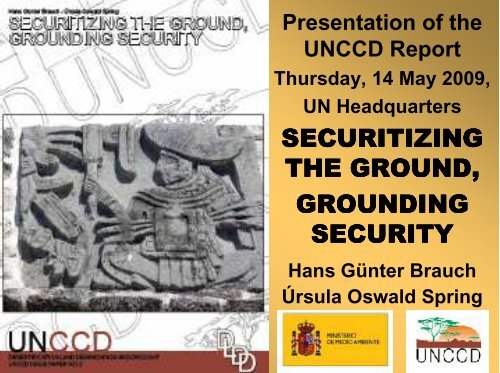
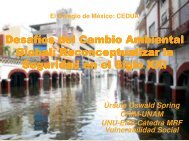
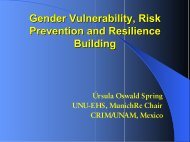
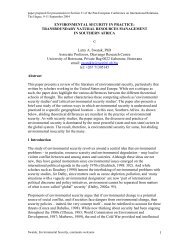
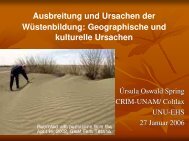
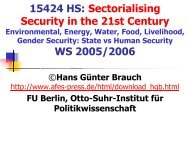

![Environmental security debates in Central Asia [and in Iran]: The ...](https://img.yumpu.com/48908494/1/184x260/environmental-security-debates-in-central-asia-and-in-iran-the-.jpg?quality=85)
